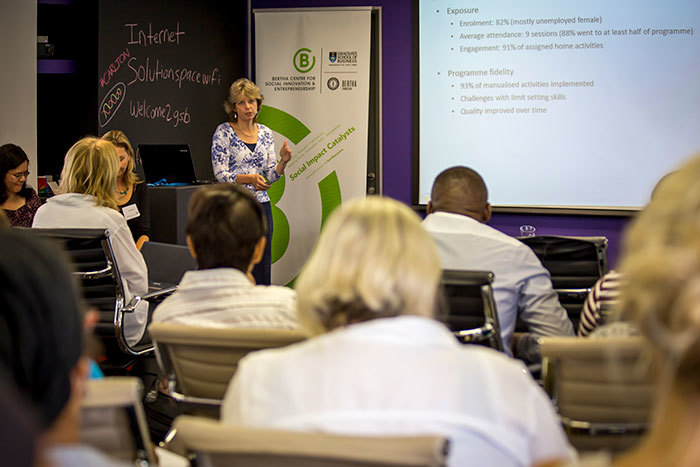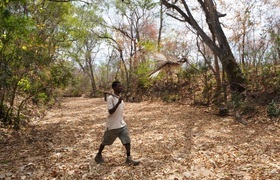Evidence base for parenting programmes on global and local agendas
12 March 2015 | Story by Newsroom
Does existing research on the impact of parenting programmes show promising results? UCT's Children's Institute and the Bertha Centre for Social Innovation and Entrepreneurship at the Graduate School of Business recently collaborated on a seminar focused specifically on parenting programmes, and their critical role in early childhood development.
Parenting programmes are high on the global agenda. The UN's Millennium Development Goals and the post-2015 development agenda recognise the critical role these programmes play in early child development (ECD). Targeting priority groups, scaling up effectively and using evidence to inform programme design and population-based delivery were all key themes discussed at a recent UCT seminar on parenting programmes, hosted by UCT's Children's Institute and the Bertha Centre for Social Innovation and Entrepreneurship at the Graduate School of Business.
A key question that the seminar sought to address was whether existing research on the impact of parenting programmes is showing any promising results, especially for vulnerable families.
An evaluation of the Sinovuyo Caring Families programme is currently under way, led by UCT's Associate Professor Cathy Ward. Sinovuyo, a parenting programme that aims to improve child behaviour and reduce maltreatment in low-income households, targets caregivers of children aged 2 to 9 years. Parents are supported through weekly group meetings run by trained community facilitators. Ward said that findings from a pilot randomised control trial (RCT) show that there's been an increase in positive parenting, although the programme's impact on child behaviour remains to be seen.
Developing a reliable evidence base on the effectiveness of parenting programmes remains a challenge. While RCTs are perceived as the 'gold standard', the cost and length of time required to conduct such studies, and the financial and human resource investment needed for programme efficacy, can be significant barriers.
Mark Tomlinson, professor of psychology at Stellenbosch University and an associate of UCT's Alan J Flisher Centre for Public Mental Health, described his experience with Thula Sana, a home-visiting parent programme targeted at mother-infant pairs in Khayelitsha, which underwent an RCT 15 years ago. The programme trained mothers how to engage their children in a sensitive, interactive way. There was a noticeable improvement in levels of attachment and sensitivity between the mothers and their children participating in the programme. That said, noticeable reductions in maternal depression were not consistent.
Nearly 80% of the initial Thula Sana study participants were enrolled, 13 years later, in a follow-up study. Programme participants showed a marked improvement in maternal depression, but whether this improvement translates to better child outcomes remains to be determined. Tomlinson also described an RCT, completed in 2013, on a book-sharing programme that targeted children aged 14 to 18 months and their caregivers. The programme encouraged storytelling – particularly that with a high element of child engagement (eg: pointing, naming and demonstrating). Programme participants showed a noticeable improvement in language, while improvement in attention was considered exceptional and especially noteworthy.
Both Thula Sana and Sinovuyo appear to be promising interventions for the promotion of early child development.
The success of ECD interventions often depends on the appropriate targeting and comprehensive assessment of families who need intervention. There is an overwhelming need for interventions that support caregivers in the South African context, particularly for those parenting under conditions of poverty, exposure to violence, ill health and other stressors.
Professor Ria Reis of Leiden University Medical Centre, University of Amsterdam and honorary professor at UCT's Children's Institute, described an assessment tool developed and widely used in the Netherlands that promotes a shared language between social service practitioners and programme participants.
Reis' research suggests that the tool removes the care professional?s monopoly on insight into care needs, instead encouraging both the professional and participant to identify needs and make joint decisions on appropriate responses.
Overall, the seminar noted the value of investing in the first 1 000 days of a child's life (from conception to two years of age), and emphasised the merits of providing parenting interventions to pregnant women and caregivers of infants. Panellists also recommended the piloting of 'lighter touch' programmes: low-intensity, low-cost adaptations that can enable wider (and possibly universal) roll-out in high demand, poorly resourced contexts. This approach, combined with scaling up more intensive programmes for targeted groups as the evidence base grows, seems a more acceptable plan in the long run.
Story by Barry Panulo. Photo by Bev Meldrum
 This work is licensed under a Creative Commons Attribution-NoDerivatives 4.0 International License.
This work is licensed under a Creative Commons Attribution-NoDerivatives 4.0 International License.
Please view the republishing articles page for more information.










